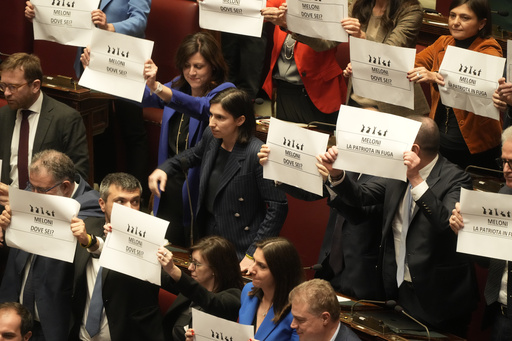ROME — Italy’s Minister of Justice, Carlo Nordio, staunchly defended the government’s controversial move to send back a Libyan warlord wanted by the International Criminal Court (ICC). During a session in the lower house of parliament, Nordio asserted that the ICC had created a “significant mess” in the case by issuing an arrest warrant that was both contradictory and flawed.
He elaborated on the warrant issued on January 18 against Ossama Anjiem, also known as Ossama al-Masri, who faces serious accusations of war crimes and crimes against humanity. The minister pointed out that the ICC had later made corrections to the warrant, fundamentally altering the timeline regarding al-Masri’s alleged crimes. “The court realized that an immense mess was made,” Nordio remarked during his address.
Since al-Masri’s release from Italian custody on January 21, human rights advocates, as well as ICC officials and opposition parties in Italy, have been highly critical of the government’s decision. Al-Masri, believed to oversee the Tripoli branch of the Reform and Rehabilitation Institution, is implicated in multiple human rights abuses linked to the government-supported Special Defense Force.
According to the ICC’s warrant, which is publicly accessible, al-Masri allegedly committed war crimes and crimes against humanity at Mitiga prison in Libya starting in 2015. Charges against him include murder, torture, rape, and sexual violence, which could lead to life imprisonment if proven. Al-Masri was detained in Turin on January 19, just after arriving from Germany for a soccer game. The Italian government maintained that he was released by a court of appeals due to a technical error in the transmission of the ICC warrant, which did not follow the proper channels through the Italian Ministry of Justice.
Nordio reiterated the technical issues, stating he received an “informal email” from Interpol only three hours after al-Masri’s arrest. He pointed out that the January 18 warrant contained multiple contradictions, particularly regarding the timeline of the alleged offenses. While the warrant claimed the crimes occurred between 2015 and 2024, its conclusions referred to actions starting from “2011 onwards.”
When the ICC subsequently revealed the details of the warrant on January 24, it announced that a revised version was issued to rectify “certain typographical and clerical errors,” which clarified that the offenses were strictly between 2015 and 2024. Human rights organizations have condemned Italy’s actions as a blatant violation of its responsibilities as an ICC founding member, as outlined in Article 89 of the Rome Statute, which mandates compliance with arrest and surrender requests.
Opposition politicians have been vocal in their criticism of Prime Minister Giorgia Meloni’s administration, calling for her to address parliament directly on the matter. On Wednesday, some lawmakers displayed signs reading, “Meloni the patriot at large,” as a form of protest. Italy has strong connections with the internationally recognized Libyan government, which it relies on to monitor its maritime borders and curb migrant departures. Critics suggest that the government capitulated to the possibility of unrest from Libyan militias had they detained al-Masri for the ICC.
Interior Minister Matteo Piantedosi denied allegations that al-Masri was involved in discussions about migration and claimed that no threats were made to Italy regarding his prior arrest. Opposition leader Elly Schlein from the Democratic Party was particularly scathing in her response to Nordio’s arguments, asserting that he had acted more like a defense attorney for a torturer rather than as a government minister.
Nordio’s critique of the ICC aligns with the government’s broader strategy to scrutinize judicial processes concerning the al-Masri case. Recently, Rome’s lead prosecutor informed Meloni and other high-ranking officials that they were under investigation for purportedly facilitating irregular migration by allowing al-Masri’s return to Libya. Meloni has publicly railed against what she sees as a politicized judiciary, a line often adopted by her late paramour in politics, former Prime Minister Silvio Berlusconi.
Nevertheless, Meloni has conceded that national security considerations influenced the decisions surrounding al-Masri’s case, stating on social media that protecting Italy’s security is of utmost importance and leaves no room for hesitation in action.
